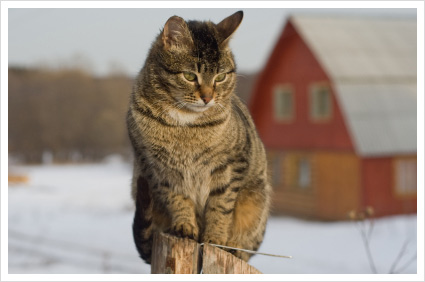In a comment to the previous entry, Birds in the Rain, loyal Apple reader Pam asked,
Another thing I've always wondered about birds: There are so many in the sky but you rarely see a dead one on the ground. Where do they go to die?
I have wondered this myself. Those rare occasions when I have seen a dead bird, I found it really disturbing, perhaps because it's something I encounter so seldom. Maybe also because it's a bird, something that's supposed to fly and be light and airy, but no, there it is dead on the ground.
OK, on with the answer.

A little songbird, in this case, a chickadee. Little birds like these may be the best at hiding themselves away from prying eyes.
(Photo from Advanced Poetry Management)
As most creatures do, when birds are feeling ill, they go to a secluded, out-of-the-way place to hunker down and try to get well. They also tend to segregate themselves from the flock. This secluded spot might be a hole in a tree, or it might be tucked away under thick grasses -- places where most humans, at least, won't see a bird hiding out.
Unfortunately, predators (cats, rats, foxes, ferrets, etc.) like to poke around in those secluded, tucked-away places. Finding a weak, sick bird all by itself with none of its fellows around to protect it, the predator enjoys an easy meal on the spot. The predator will eat just about every bit of the bird there is.

Cats like to eat birds. That's how it is.
(Photo from the Black & Orange Cat Foundation)
Many predators may also take the sick or injured bird home to its young, and they'll consume most of it at their house. The predators' homes also tend to be tucked away from us people, so we don't see the bird-meal in action, nor do we see any of the leftovers.
In far fewer cases, a bird might be killed out in the open -- that is, in places where we humans regularly come and go. In these instances, the bird has usually been killed by a domestic cat or perhaps has run into some human-built structure.
Wherever and however the bird dies, there will still be at least some of its body left on the ground. But in very short order, that gets eaten, too. Bird scavengers can be all sorts of creatures, from raccoons to crows to cats to beetles to ants to bacteria to fungi. Regardless of who is involved in it, the process of carcass removal is very fast.
This all sounds rather unpleasant, but let me tell you a story.
Once upon a time, an empty house next door to where I used to live had a roach problem. I liked to sit out on my porch at night, but then I'd see those things crawling all over the next door steps. So I'd go over there and smash the heck out of them and then go sit back down on my porch. Within minutes, reconnaissance ants would start showing up and inspecting the carnage. After a few more minutes, there'd be a stream of ants all around the smashed bugs. By the light of street and porchlight, I watched those ants dismantle the roaches bit by bit and cart the bits away. It was slow work and I got tired before the ants did. Next morning when I came out, there was not one single sign that any bugs had been there at all. It didn't matter how many roaches I'd smashed, the steps the next day were always as clean as if somebody had scrubbed them with soapy water and a sponge. I was downright impressed that those little ants could do so much work so quickly and so thoroughly. I mean, there was not a speck left behind.
The point is, everybody's got a job to do. Some jobs -- like singing pretty songs and flitting around eating bugs -- seem more palatable to us than others. But if those ants and raccoons and fungi didn't come and clean up the dead birds and animals, we'd have a massive and stinky mess on our hands very fast. So be glad they do such a good job, especially since it's not a job we ourselves would like to do at all.
The ant. This one's a pavement ant. Mightier than you might think.
(Photo from Pest Control Shark)
I promise I'll have a cheerier entry for you next time.
Sources
Ask Yahoo! Where do birds go to die? September 21, 1998
Bird Ecology Study Group, Where do birds go when they die? May 12, 2008
University of California, Ask it! - birds and bees, May 20, 2008
WildBird on the Fly, Where do dead birds go? May 27, 2008
Royal Society for the Protection of Birds, Ask an expert, Where do birds go to die? June 2, 2008
Hey! Thanks for the info. It makes perfect sense and does fit in with each creature's part in everything. I really do prefer the birds to be singing and flying around also. :o) www.satisfiedsole.com
ReplyDeleteOne time when I was in Argentina, a bird fell out of the sky and died at my feet. It was traumatizing. Good to know it's not the norm, just my back luck
ReplyDelete